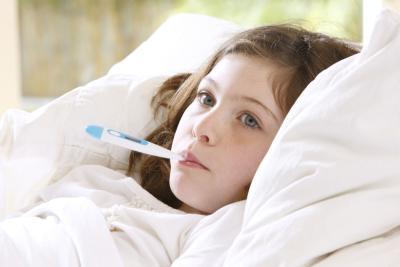High fevers accompany many childhood illnesses, but they often also cause anxiety for parents. Seizures that occur with a high fever cause even more anxiety and concern. These fever-related seizures are also known as febrile seizures. Understanding febrile seizures and recognizing the symptoms better prepares you for handling them if your child experiences one.
Description
Febrile seizures typically occur when fevers reach 102 degrees F or higher, according to BabyCenter. It is possible for your child to have a seizure at a lower temperature. Convulsions, twitching or jerking are common signs of a febrile seizure. Your child might also drool, vomit, roll eyes, moan, have stiff limbs, darker skin or become unconscious. The length of the febrile seizure varies, from a few seconds to 15 minutes. After the seizure, your child might appear sleepy. Febrile seizures are generally not dangerous.
Time Frame
Fever-related seizures affect children between 6 months and 5 years of age, with the most common age range between 12 and 18 months. Only about 3 to 5 percent of children experience febrile seizures, but having one increases the chances of subsequent febrile seizures. BabyCenter notes that about one-third of children who have one seizure will have another.
Treatment
The child needs a soft and safe place to be while having a febrile seizure. Remove any potential dangers and ensure she cannot fall during the seizure. Placing your child on her side prevents choking, especially if she vomits during the seizure. Loose clothing prevents additional constriction during the seizure. Call 911 if your child shows signs of breathing difficulty or if the seizure lasts several minutes.
Warning
There are certain things you should not do during your child’s febrile seizure. Never restrain your child or try to hold him to stop the seizure. Your child’s mouth needs to remain free of any objects so you shouldn’t stick anything in his mouth. BabyCenter also warns against trying to reduce his fever during the seizure with medications or by placing him in cool water.
Follow-Up
A febrile seizure that ends on its own after a few minutes and doesn’t result in breathing difficulty does not need immediate medical attention in the emergency room in most cases. You should contact your child’s physician when the seizure ends. The doctor will likely want to see your child for an evaluation to determine if additional testing or treatment is necessary.





